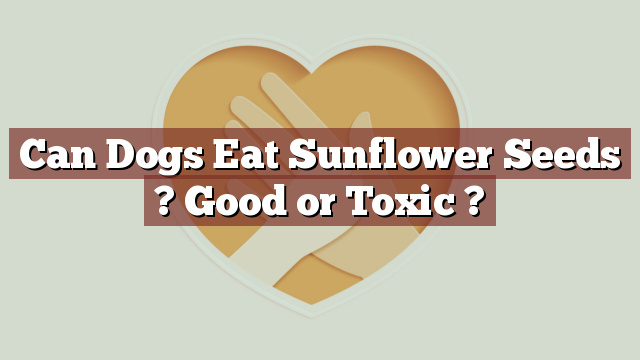Can Dogs Eat Sunflower Seeds? Good or Toxic?
It is important for pet owners to be aware of what foods are safe for their furry friends to consume. Dogs have different dietary needs than humans, and certain foods that may be harmless to us can actually be toxic to them. In this article, we will explore whether dogs can eat sunflower seeds, and if so, the potential risks and benefits associated with them.
Nutritional Value of Sunflower Seeds: Vitamins, Minerals, and More
Sunflower seeds are packed with various vitamins, minerals, and other nutrients that offer several health benefits. They are an excellent source of vitamin E, which is an antioxidant that helps protect cells from damage. Sunflower seeds also contain B vitamins, such as thiamine, niacin, and folate, which are important for energy production and a healthy nervous system. Additionally, they provide minerals like magnesium, iron, and zinc, all of which play vital roles in maintaining overall health.
Can Dogs Eat Sunflower Seeds? Safety and Potential Toxicity Explained
Can dogs eat sunflower seeds? The answer is yes, dogs can eat sunflower seeds. However, it is crucial to ensure that the seeds are given to them in moderation and without any added flavors or seasonings. Plain, raw, and unsalted sunflower seeds are the safest option for dogs. Roasted or salted seeds, on the other hand, should be avoided as they can lead to various health problems.
While sunflower seeds are generally safe for dogs, it is important to note that some dogs may have allergies or sensitivities to certain types of seeds. If you are introducing sunflower seeds to your dog’s diet for the first time, keep a close eye on them for any signs of digestive upset or allergic reactions.
Potential Risks and Benefits of Sunflower Seeds for Dogs
Sunflower seeds can offer certain benefits to dogs when given in moderation. The vitamin E content in sunflower seeds can contribute to a healthy skin and coat, as well as support immune function. The B vitamins present in these seeds are also essential for a dog’s overall well-being and can help maintain a healthy metabolism.
However, it is important to be cautious of the potential risks associated with feeding sunflower seeds to dogs. The high fat content in these seeds can lead to weight gain and other digestive issues if consumed excessively. Additionally, the hard shell of the seeds can present a choking hazard or cause intestinal blockage if not chewed properly.
What to Do If Your Dog Eats Sunflower Seeds: Signs, Treatment, and Prevention
If your dog accidentally consumes a small amount of sunflower seeds, there is usually no need to panic. However, if your dog ingests a large quantity, experiences digestive distress, or shows any signs of an allergic reaction, it is best to seek veterinary advice immediately.
To prevent any potential problems, always supervise your dog while they are eating sunflower seeds and make sure they are not consuming them in large amounts. If you suspect that your dog has an allergy or sensitivity to sunflower seeds, consult with your veterinarian to determine the best course of action.
Conclusion: Sunflower Seeds in Moderation Can Be a Safe and Nutritious Treat for Dogs
In conclusion, dogs can safely consume sunflower seeds as long as they are given in moderation and in their raw, unsalted form. These seeds can provide various nutritional benefits, including vitamins, minerals, and antioxidants. However, it is crucial to be aware of potential risks such as allergies, digestive issues, and choking hazards. As with any new addition to your dog’s diet, it is always best to consult with a veterinarian to ensure the safety and well-being of your furry friend.
Thank you for investing your time in exploring [page_title] on Can-Eat.org. Our goal is to provide readers like you with thorough and reliable information about various dietary topics. Each article, including [page_title], stems from diligent research and a passion for understanding the nuances of our food choices. We believe that knowledge is a vital step towards making informed and healthy decisions. However, while "[page_title]" sheds light on its specific topic, it's crucial to remember that everyone's body reacts differently to foods and dietary changes. What might be beneficial for one person could have different effects on another. Before you consider integrating suggestions or insights from "[page_title]" into your diet, it's always wise to consult with a nutritionist or healthcare professional. Their specialized knowledge ensures that you're making choices best suited to your individual health needs. As you navigate [page_title], be mindful of potential allergies, intolerances, or unique dietary requirements you may have. No singular article can capture the vast diversity of human health, and individualized guidance is invaluable. The content provided in [page_title] serves as a general guide. It is not, by any means, a substitute for personalized medical or nutritional advice. Your health should always be the top priority, and professional guidance is the best path forward. In your journey towards a balanced and nutritious lifestyle, we hope that [page_title] serves as a helpful stepping stone. Remember, informed decisions lead to healthier outcomes. Thank you for trusting Can-Eat.org. Continue exploring, learning, and prioritizing your health. Cheers to a well-informed and healthier future!

